英汉翻译讲义 Unit 6
- 格式:doc
- 大小:40.00 KB
- 文档页数:3
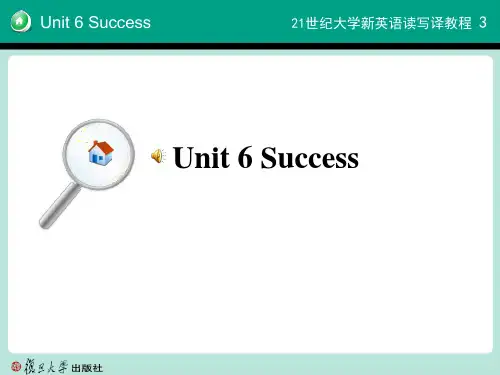
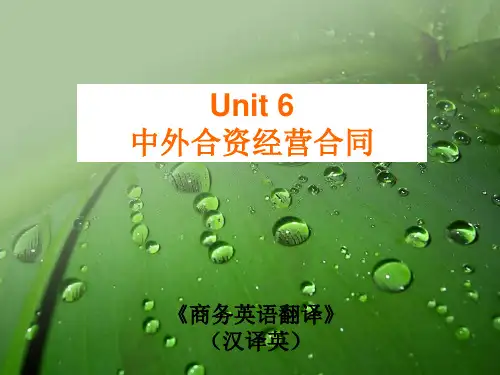
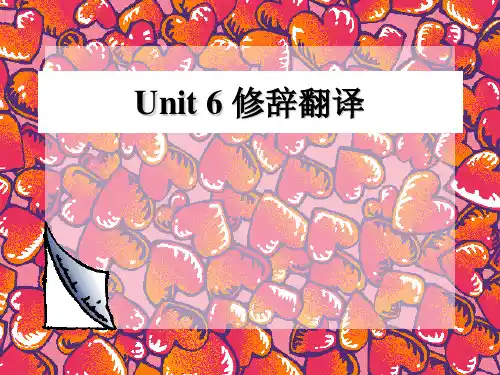
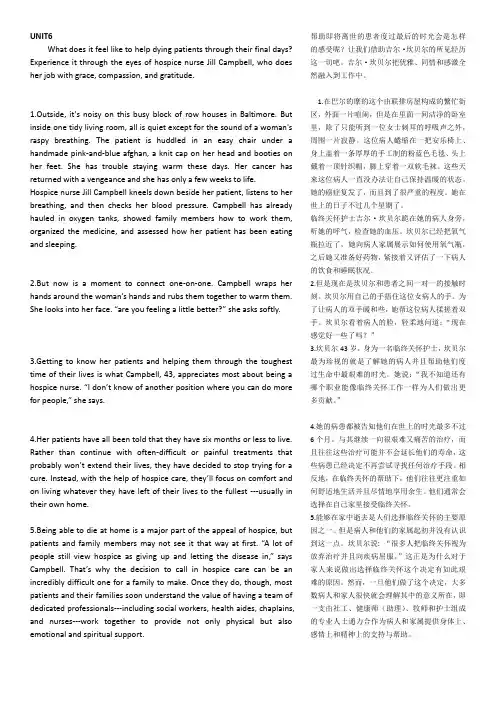
UNIT6What does it feel like to help dying patients through their final days? Experience it through the eyes of hospice nurse Jill Campbell, who does her job with grace, compassion, and gratitude.1.Outside, it's noisy on this busy block of row houses in Baltimore. But inside one tidy living room, all is quiet except for the sound of a woman's raspy breathing. The patient is huddled in an easy chair under a handmade pink-and-blue afghan, a knit cap on her head and booties on her feet. She has trouble staying warm these days. Her cancer has returned with a vengeance and she has only a few weeks to life. Hospice nurse Jill Campbell kneels down beside her patient, listens to her breathing, and then checks her blood pressure. Campbell has already hauled in oxygen tanks, showed family members how to work them, organized the medicine, and assessed how her patient has been eating and sleeping.2.But now is a moment to connect one-on-one. Campbell wraps her hands aro und the woman’s hands and rubs them together to warm them. She looks into her face. “are you feeling a little better?” she asks softly.3.Getting to know her patients and helping them through the toughest time of their lives is what Campbell, 43, appreciates most about being a hospice nurse. “I don’t know of another position where you can do more for people,” she says.4.Her patients have all been told that they have six months or less to live. Rather than continue with often-difficult or painful treatments that probably won’t extend their lives, they have decided to stop trying for a cure. Instead, with the help of hospice care, they’ll focus on comfort and on living whatever they have left of their lives to the fullest ---usually in their own home.5.Being able to die at home is a major part of the appeal of hospice, but patients and family members may not see it that way at first. “A lot of people still view hospice as giving up and letting the disease in,” says Campbell. That’s why the decision to c all in hospice care can be an incredibly difficult one for a family to make. Once they do, though, most patients and their families soon understand the value of having a team of dedicated professionals---including social workers, health aides, chaplains, and nurses---work together to provide not only physical but also emotional and spiritual support. 帮助即将离世的患者度过最后的时光会是怎样的感受呢?让我们借助吉尔·坎贝尔的所见经历这一切吧。
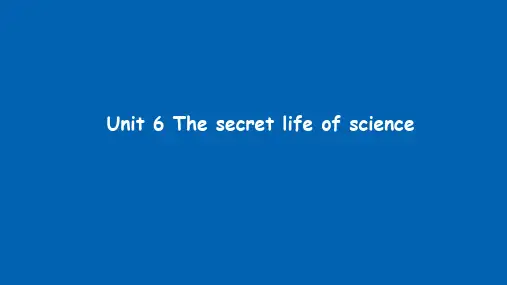

Unit 6 ShoppingUnit 6 A-Let's talk英语课文翻译Assistant: Can I help you?售货员:我能为您做点什么?John: Yes. These shoes are nice. Can I try them on? Size 6, please. 约翰:是的。
这双鞋不错。
我能试试吗?请给我拿6号的。
Assistant: Of course. Here you are.售货员:当然可以。
给你。
Mum: John, are they OK?妈妈:约翰,它们可以吗?John: No. They're too small.约翰:不。
它们太小了。
Mum: Hmm. OK. Let's try size 7.妈妈:嗯,好的。
让我们试试7号的。
John: They're just right!约翰:它们正好!Mum: Good!妈妈:太好了!Unit 6 A-Listen and chant.英语课文翻译Two little birds are sitting on a wall.两只小鸟正停落在墙上。
One is big and the other is small.一只很大,另一只很小。
A cute little girl is playing with a ball.一个可爱的小女孩正在玩一个球。
Be careful, little girl!小心,小女孩!Don't knock them off the wall!不要把它们从墙上撞飞!Unit 6 B-Let's talk英语课文翻译Mum: Sarah, how do you like this skirt?妈妈:萨拉,你觉得这条短裙怎么样?Sarah: It's very pretty.萨拉:它很漂亮。
Assistant: Can I help you?售货员:我能为您做点什么?Mum: Yes. How much is this skirt?妈妈:是的。
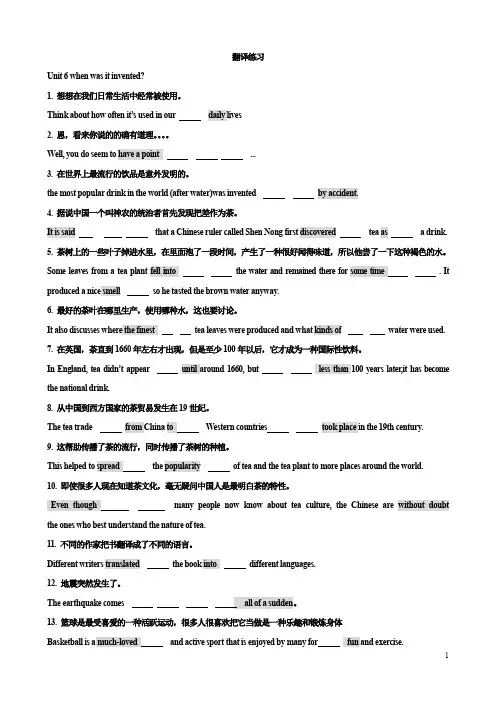
翻译练习Unit 6 when was it invented?1. 想想在我们日常生活中经常被使用。
Think about how often it’s used in our daily lives2. 恩,看来你说的的确有道理。
Well, you do seem to have a point ...3. 在世界上最流行的饮品是意外发明的。
the most popular drink in the world (after water)was invented by accident.4. 据说中国一个叫神农的统治者首先发现把差作为茶。
It is said that a Chinese ruler called Shen Nong first discovered tea as a drink.5. 茶树上的一些叶子掉进水里,在里面泡了一段时间,产生了一种很好闻得味道,所以他尝了一下这种褐色的水。
Some leaves from a tea plant fell into . It produced a nice smell so he tasted the brown water anyway.6. 最好的茶叶在哪里生产,使用哪种水,这也要讨论。
It also discusses where the finest tea leaves were produced and what kinds of water were used.7. 在英国,茶直到1660年左右才出现,但是至少100年以后,它才成为一种国际性饮料。
In England, tea didn’t appear until around 1660, but less than 100 years later,it has become the national drink.8. 从中国到西方国家的茶贸易发生在19世纪。
The tea trade from China to Western countries took place in the 19th century.9. 这帮助传播了茶的流行,同时传播了茶树的种植。
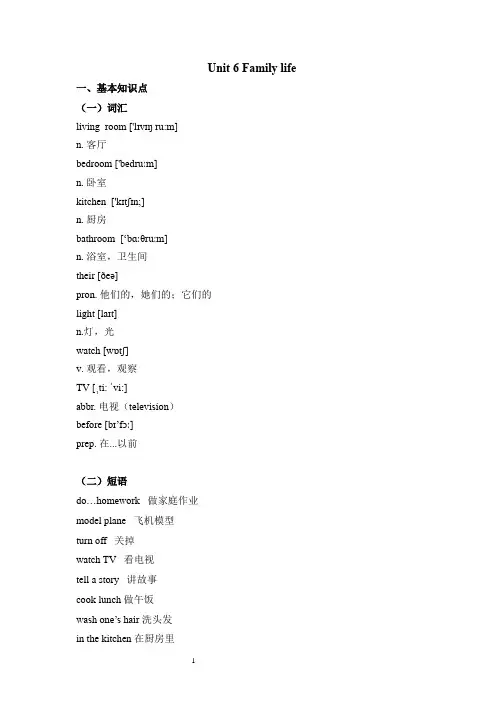
Unit 6 Family life 一、基本知识点(一)词汇living room ['lɪvɪŋ ru:m]n. 客厅bedroom ['bedruːm]n. 卧室kitchen ['kɪtʃɪn;]n. 厨房bathroom [‘bɑːθruːm]n. 浴室,卫生间their [ðeə]pron. 他们的,她们的;它们的light [laɪt]n.灯,光watch [wɒtʃ]v. 观看,观察TV [ˌti: ˈvi:]abbr. 电视(television)before[bɪ’fɔː]prep. 在...以前(二)短语d o…homework 做家庭作业model plane 飞机模型turn off 关掉watch TV 看电视tell a story 讲故事cook lunch 做午饭wash one’s hair 洗头发in the kitchen 在厨房里in the bathroom 在浴室里in the evening 在晚上(三)句型1.询问对方通常和某人一起干什么的句型及其答语What do you usually do with your grandpa ?I usually play chess with my grandpa.What do you usually do with your mother?I usually go shopping with my mother.2.表达“我们两个都喜欢”的句型We both like English.We both like swimming.3.描述某人正在做某事的句型I am doing my homework.He is reading a book.They are swimming in the sea.(四)重难点、易错点1. 现在进行时2. v-ing形式3. 音标:[br] [kr]4. 写作:学会如何用现在进行时描述家人、朋友进行的日常活动。
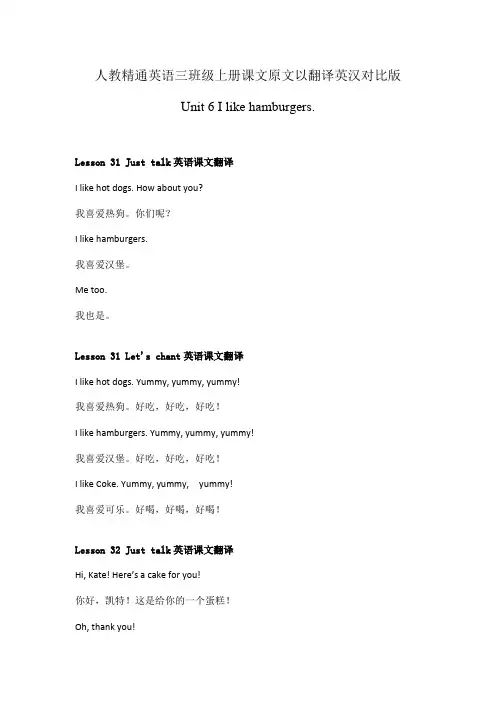
人教精通英语三班级上册课文原文以翻译英汉对比版Unit 6 I like hamburgers.Lesson 31 Just talk英语课文翻译I like hot dogs. How about you?我喜爱热狗。
你们呢?I like hamburgers.我喜爱汉堡。
Me too.我也是。
Lesson 31 Let's chant英语课文翻译I like hot dogs. Yummy, yummy, yummy!我喜爱热狗。
好吃,好吃,好吃!I like hamburgers. Yummy, yummy, yummy!我喜爱汉堡。
好吃,好吃,好吃!I like Coke. Yummy, yummy,yummy!我喜爱可乐。
好喝,好喝,好喝!Lesson 32 Just talk英语课文翻译Hi, Kate! Here’s a cake for you!你好,凯特!这是给你的一个蛋糕!Oh, thank you!哦,感谢你们!Happy birthday!生日欢乐!Lesson 32 Let's sing歌曲翻译Happy birthday to you!祝你生日欢乐!Happy birthday to you!祝你生日欢乐!Happy birthday to you!祝你生日欢乐!Happy birthday! Happy birthday!生日欢乐!生日欢乐!Happy birthday to you!祝你生日欢乐!Lesson 33 Just talk英语课文翻译Have an apple.吃一个苹果。
No, thanks. I like pears.不,感谢。
我喜爱梨。
OK. Here you are.好的。
给你。
Thank you!Lesson 33 Let's chant英语课文翻译I like pears. Me too!我喜爱梨。
我也是!I like bananas. Me too!我喜爱香蕉。

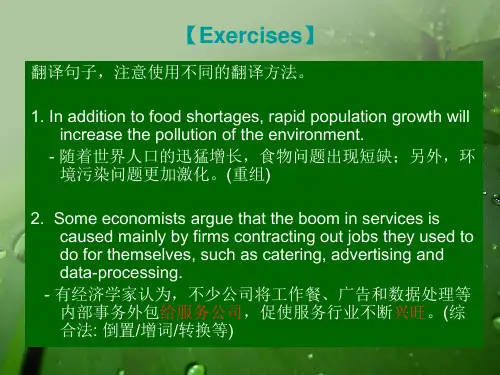
Unit6 和自然和睦相处温德尔·伯利1和他们的对手工业经济的保护者一样,大自然的保护者有时也认为自然和人类是完全不同完全不相关联的两个实体。
就像工业家常常明确表明他们致力于对自然的完全占有或者如同他们所说,彻底征服自然一样,他们所说,彻底征服自然一样,大自然的保护者往往反对任何人类对大自然的侵犯。
大自然的保护者往往反对任何人类对大自然的侵犯。
2这两种极端对立的观点是危险的,最好是让人们意识到自然和人类彼此毫无关联的设想只是一种纯粹的理念;而实际情况并非如此。
3纯自然的环境不适合人类生活,人类不愿意也不能在此环境中长期生活,如果我们身处恶劣的气候达几个小时之久,就会渴望得到一些生活的必需品,抵御风寒的衣物、住所、熟食、亲友的陪伴——甚至想洗个热水澡,看看书,听听音乐。
4纯人文的环境同样也不适合人类生活,人类也不想长久地生活于这种环境之中。
很显然人类所处的环境越人造化,“天然”这个词就越被人珍视。
确实,我们可以说,我们当今的自然资源保护运动在很大程度上是工业革命的产物。
然资源保护运动在很大程度上是工业革命的产物。
渴望得到新鲜的空气,渴望得到新鲜的空气,渴望得到新鲜的空气,清澈的溪流,清澈的溪流,看到原始森林,大草原和大沙漠的人是哪些不再享有这些自然资源的人们。
5人们不可能离开自然生活,这是生态环境保护主义者的重要观点,,这是生态环境保护主义者的重要观点,但是人们又不可能在纯但是人们又不可能在纯自然的环境中生活而不对它作丝毫的改造。
这一点也适用于所有的生物。
人和其它生物都依赖于自然并且需要改造自然。
从某种意义上讲,我们所说的自然是各种各样生物和自然的力量在它们错综复杂的活动相互影响和变化的过程中所造成的变化的总和。
因为有了啄木鸟,自然就因此而有所不同,自然也因为有了生活在树干中的穿孔虫和蚂蚁以及在树下土壤里的细菌而有所不同,这些不同的组合就形成了世界。
6有些野生动物制造的变化是有利的,海狸制造水塘是出了名的,这些水塘后来成了肥沃的牧场,树和草原上的草可以防止水土流失。
Unit-6-Risks新编大学英语第二版第四册课文翻译Unit 6 RisksRisks and YouAt some time or other, all of us have played the part of a hypochondriac, imagining that we have some terrible disease on the strength of very minor symptoms. Some people just have to hear about a new disease and they begin checking themselves to see if they may be suffering from it. But fear of disease is not our only fear, and neither is risk of disease the only risk we run. Modern life is full of all manner of threats-to our lives, our peace of mind, our families, and our future. And from these threats come questions that we must pose to ourselves: Is the food I buy safe? Are toys for my children likely to hurt them? Should my family avoid smoked meats? Am I likely to be robbed on vacations? Our uncertainties multiply indefinitely.Anxiety about the risks of life is a bit like hypochondria; in both, the fear or anxiety feeds on partial information. But one sharp difference exists between the two. The hypochondriac can usually turn to a physician to get a definitive clarification of the situation-either you have the suspected disease or you don't. It is much more difficult when anxiety about other forms of risk is concerned, because with many risks, the situation is not as simple.Risks are almost always a matter of probability rather than certainty. You may ask, "Should I wear a seat belt?" If you' re going to have a head-on collision, of course. But what if you get hit from the side and end up trapped inside the vehicle, unable to escape because of a damaged seat belt mechanism? So does this mean that you should spend the extra money for an air bag? Again, inhead-on collisions, it may well save your life. But what if the bag accidentally inflates while you are driving down the highway, thus causing an accident that would never have occurred otherwise?All of this is another way of saying that nothing we do is completely safe. There are risks, often potentially serious ones, associated with every hobby we have, every job we take, every food we eat-in other words, with every action. But the fact that there are risks associated with everything we are going to do does not, or should not, reduce us to trembling neurotics. Some actions are riskier than others. The point is to inform ourselves about the relevant risks and then act accordingly.For example, larger cars are generally safer than small ones in collisions. But how much safer? Theanswer is that you are roughly twice as likely to die in a serious crash in asmall car than in a large one. Yet larger cars generally cost more than small ones (and also use more gas, thus increasing the environmental risks!), so how do we decide when the reduced risks are worth the added costs? The ultimate risk avoider might, for instance, buy a tank or an armored car, thus minimizing the risk of death or injury in a collision. But is the added cost and inconvenience worth the difference in price, even supposing you could afford it?We cannot begin to answer such questions until we have a feel for the level of risks in question. So how do we measure the level of a risk? Some people seem to think that the answer is a simple number. We know, for instance, that about 25,000 people per year die inautomobile accidents. By contrast, only about 300 die per year in mine accidents and disasters. Does that mean that riding in a car is much riskier than mining? Not necessarily. The fact is that some 200 million Americans regularly ride in automobiles in the United States every year; perhaps 700,000 are involved in mining. The relevant figure that we need to assess a risk is a ratio or fraction. The numerator of the fraction tells us how many people were killed or harmed as the result of a particular activity over a certain period of time; the denominator tells us how many people were involved in that activity during that time. All risk levels are thus ratios or fractions, with values between 0 (no risk) and 1 (totally risky).By reducing all risks to ratios or fractions of this sort, we can begin to compare different sorts of risks-likemining versus riding in a car. The larger this ratio, that is, the closer it is to 1, the riskier the activity in question. In the case just discussed, we would find the relative safety of car travel and coal mining by dividing the numbers of lives lost in each by the number of people participating in each. Here, it is clear that the riskiness of traveling by car is about 1 death per 10,000 passengers; with mining, the risk level is about 4 deaths per 10,000 miners. So although far more people are killed in car accidents than in mining, the latter turns out to be four times riskier than the former. Those ratios enable us to compare the risks of activities or situations as different as apples and oranges. If you are opposed to risks, you will want to choose your activities by focusing on the small-ratio exposures. If you are reckless, then you are not likelyto be afraid of higher ratios unless they get uncomfortably large.Once we understand that risk can never be totally eliminated from any situation and that, therefore, nothing is completely safe, we will then see that the issue is not one of avoiding risks altogether but rather one of managing risks in a sensible way. Risk management requires two things: common sense and information about the character and degree of the risks we may be running.风险与你1 在说不定的某个时候,我们大家都曾充当过疑病症患者的角色,只凭一些轻微的症状便怀疑自己得了某种可怕的病。
Unit 6 let’s go shopping第六单元凯蒂在哪?单元单词(10个)·go shopping英/ 购物I live just by the market, and it's very convenient to go shopping.(我家就住在商场旁边,买东西很方便。
)·Hooray!英[hʊ'reɪ] / int.(表示快乐或赞同)好极了!Happy Holiday, Hooray English!(快乐假期,欢乐英语!)·dress英[dres] / n.连衣裙Look at my dress.(看我的连衣裙。
)·don't=do not英/ 不,不是,不要Oh, I don't like grapes.(哦,我不喜欢葡萄。
)·How about…?英/ ……怎么样?Well, I enjoyed that. How about you two?(嗯,我觉得那很棒。
你们俩呢?)·skirt英[skɜːt] / n.短裙I like your skirt.(我喜欢你的裙子。
)·shorts英[ʃɔːts] / n.短裤I like your shorts.(我喜欢你的短裤。
)·T-shirt英['ti, ʃɜ:t] / n.T恤衫;短袖汗衫I like your T-shirt.(我喜欢你的T恤衫。
)·blouse英['blaʊz] / n.(女式)短上衣,衬衫She wears a white blouse today.(今天她穿了一件白色衬衫。
)·hat英[hæt] / n.(常指带檐的)帽子Several styles of hat were available.(帽子有几种款式。
)课文翻译Pages 28-29Story time28-29页故事时间Let’s go shopping,Lingling.我们去购物吧,玲玲。
Unit6 Why They CameNot many decisions could have been more difficult for a family to make than to say farewell to a community where it had lived for centuries, to abandon old ties and familiar landmarks, and to sail across dark seas to a strange land. Today, when mass communications tell one part of the world all about another, it is quite easy to understand how poverty or tyranny might force people to exchange an old nation for a new one. But centuries ago migrationwas a leap into the unknown. It was an enormous intellectual and emotional commitment. The forces that moved early immigrants to their great decision---the decision to leave their homes and begin an adventure filled with uncertainty, risk and hardship---must have been of overpowering proportions (overwhelming, overcoming). As Oscar Handlin states, the early immigrants of America “would collide with unaccustomed problems, learn to understand alien ways and alien languages, manage to survive in a very foreign environment..”对于一个家庭来说,比和他们已经生活了几个世纪的环境说再见的事情更难的事情没有几件,去抛弃过去的羁绊,熟悉的土地,穿过无尽的大海去到一片陌生的土地。
Unit 6Affirmative and Negative肯定与否定英语否定类型大致有4类完全否定,半否定,部分否定,带否定意义的词语,迂回否定翻译方法正说反译,反说正译,正反均可需要根据英语及汉语的习惯表达。
Scarcely an aspect that isn’t being upended方方面面无不受到冲击Without much time for life --- or love很少有时间享受生活或谈情说爱They weren’t picked because they were out of shape他们没有得到异性的青睐是因为体型不佳What affirmative in form in one language may often mean something negative in another.Full negatives: no, not, none, never, nothing, nothing, nobody, nowhere, neither, nor.Semi negatives: hardly, scarcely, seldom, barely, few, little…Partial negatives: not every, not all, not both, not much, not many, not always….Words with negative implication: fail, without, beyond, until, unless, lest , ignorant, refrain, refuse, neglect, absence, instead of, other than, except, rather than….In most cases, these negative expressions can be translated literally, but in some circumstances, they should be readjusted according to different context.英语肯定,汉语否定He denied it to be the case他说事实不是这样Time is what we want most, but what, alas, many use worst时间是我们最缺少的,但可叹的是,偏偏许多人最不善于利用I have read your article, I expected to meet an older man拜读了你的大作,没想到你这样年轻。
Unit 6 Omission
教学目的:
通过对以前所学习的英语和汉语句法结构的区别的回顾,在把英语翻译成汉语的过程中,把握如何删减不必要的词语,使译文表达通顺、自然,减词不减意。
教学重点:
省略法的运用1. 代词的省略.2.冠词的省略 3. 介词的省略4. 连词的省略 5. 动词的省略 6. 非人称代词 "It"的省略
教学内容:
所谓省词译法,就是把原文中需要而译文中不需要的单词、词组等在翻译过程中加以省略。
英汉翻译过程中词语减省译法大致分为两类:句法性减省和修辞性减省。
1. 省略冠词Article
不定冠词(a/an)最基本的意义是“一”,表示数字概念时不能省略,但用于引伸意义表示类别,或用在固定短语中,可省略不译。
定冠词(the)用在表示方位的名词前,或形容词(形容词最高级)、专有名词之前,特别是用在固定短语或词组中时,常常省略不译。
Ex 1. The horse is a useful animal.
Ex 2. The earth goes around the sun.
2.省略介词Preposition
一般说来,表示时间和地点的英语介词,译成汉语如出现在句首,大都可以省略,出现在句尾大都不省略。
Ex 3. On July 1, 1997, Hong Kong returned to the People’s Republic of China.
Ex 4. Smoking is prohibited in public places.
3. 省略代词Pronouns
人称代词we,you,及不定代词one,ones在句中含有泛指的意思时,常可省略不译;it在句中(引导主语、宾语、或强调句中)作为引导词,没有实际意义,可省略;作宾语或同位语用的反身代词,常可省略不译;作定语用的物主代词,常可省略不译,这样其关系更为明确些。
Ex 5. We live and learn.
Ex 6. 有条件要上;没有条件,创造条件也要上。
课堂互动1:
1. He left without saying a word.
2.. The People’s Republic of China was founded in 1949.
3. If you want to kill a snake you must hit it first on the head and if you want to catch a band or
robbers you must first catch their leader.
4. When will he arrive?—You can never tell.
4. 省略连接词Conjunction
汉语词语之间连接词用得不多,其上下逻辑关系常常是暗含的,由词语的次序来表示。
英语则不然,连接词用得比较多。
因此,英译汉时在很多情况下可不必把连接词译出来。
省略并列连接词
Ex 7.The sun is bright, and the sky is clear.
省略表示原因的连接词
Ex 8. As it is late, you had better go home.
省略表条件的连接词
Ex 9. If winter comes, can spring be far behind?
省略表示时间的连接词
Ex 10. When it is dark in the east, it is light in the west; when things are dark in the south there is still light in the north.
5. 省略动词或系动词Verb
动词一般不能省略,但某些动词(如give make come take pay…)与具有动作意义的名词连用时可以省略;系动词(如become go get…)也可以省略。
Ex11. When the pressure gets low, the boiling-point becomes low.
Ex 12. 总理在出席音乐会之前,还有许多工作要做。
6. 省略名词Nouns
Ex 13. Men and women, old and young, all joined the battle.
Ex 14. 这架电视机真是价廉物美。
7. Omission of redundant words
Ex 15. Part-time job hunters who have worked at a job will receive preference over those who have not.
Ex 16. There was no snow, the leaves were gone from the trees, the grass was dead.
Ex 17. 人群渐渐静了下来。
Ex 18. 在工作中,我们必须避免不必要的错误。
课堂互动2:
1.Then came the development of the microcomputer.
2. 她连续讲了两个小时法语,没有出现任何的错误。
3. Neither party shall cancel the contract without sufficient cause or reason.
4. 中国足球的落后状态必须改变。
Summary
无论是英译汉还是汉译英,省词法都是出于译文语言习惯和语法的需要,不省去这些词语,译文就显得拖泥带水,甚至会出现画蛇添足的结果。